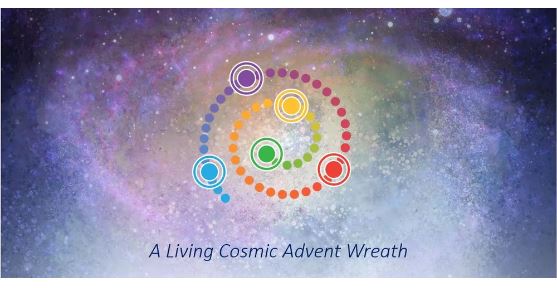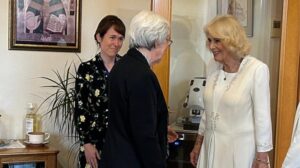Advent, the season of preparation for Christmas is now underway (1 December-24 December).
The Cosmic wreath is rooted in “deep incarnation.” This invites us into a radically different relationship with the world, a relationship where everything and everyone matters.
 Week 1 (December 1-7) : Birth of the Universe
Week 1 (December 1-7) : Birth of the Universe
Week 2 (December 8-14): Birth of the Solar system
Week 3 (December 15-21): Birth of Jesus, the Christ
Week 4 (December 22-24): My Birth into the whole Cosmic Body of the Universe
The 5th moment is centered in “All is One”, the moment that Pope Francis calls “the joy of our hope.”
- As we begin Week FOUR: My birth into whole cosmic body of the universe…I/we are aware you accepted me in my most naked being of beginning. Now, joined to all being and in consciousloving trust i/we pray to move forward on the great journey of life into death into new life. I/we believe all life came from You and is forever on a spiraling journey back to You. adapted from Ed Hays
COME, waken me/us to WONDER
We have the power to create a new world, and we have the power to destroy this one. How we choose depends on how we grasp this moment as the kiss of God, impelling us to stand up and speak. (Ilia Delio)
- As we begin Week THREE: Birth of Jesus the Christ…we pray to
“fall in love once again with the Great Mystery of God’s care for us — Divine Incarnation so deep and long –as to take on our bodied lives as God’s very own, even our most humble begin nings and endings, and finally, see each day asopportunity to BEAR CHRIST ever newly.” John Kavanaugh, SJ
Come, awaken, awaken me/us to love
The Lord is coming, always coming. When you have ears to hear and eyes to see, you will recognize Him at any moment in your life. Life is Advent; life is recognizing
the coming of the Lord. (Henri Nouwen)
- As we begin Week TWO: Birth of the Solar System…we pray Triune God, wondrous community of infinite love, teach us to contemplate You in the beauty of the universe, for all things speak of You. Awaken our praise and thankfulness for every being that you have made. Give us the grace to feel profoundly connected to everything that is.” Laudato Si’
Come, Wondrous Community of infinite Love..Come , awaken me/us us to PRAISE
This vast ocean of our solar system is like a womb that has unfolded over some fivbillion years to become galaxies and stars, palms and pelicans, the music of Bach and each of us alive today. (Brian Swimme)
- As we begin Week ONE: Birth of the Universe … we pray– for an awareness of the oneness of the universe, vast and vibrating with the sound of its beginning. Like the First Flaring Forth, this small flame reminds me/us of our presence in THE CHRIST in whom we live and move and have our being in this everexpanding universe. John 1:1-5; Is 40:1-5, 9-11
Come, Sacred Source of All Life …Come, waken me/us to ONENESS and to recognize your love within all life.
“God’s first idea” was to become manifest – to pour out divine, infinite love into finite visible forms. The “First Flaring Forth” (Big Bang) is now our scientific name for that first idea; and Christ is our theological name. Both are about LOVE and BEAUTY exploding outward in all directions.
(Richard Rohr)
In this video Elizabeth Davis rsm explores with us the meaning of the Cosmic Advent Wreath, grounded in “deep incarnation” and the way to create our own to mark the passage of the four weeks of Advent:
El Adviento, tiempo de preparación para la Navidad, ya está en marcha (del 1 al 24 de diciembre).
La Corona Cósmica tiene sus raíces en la «encarnación profunda». Esto nos invita a una relación radicalmente diferente con el mundo, una relación en la que todo y todos importan.
Semana 1: Nacimiento del Universo
Semana 2: Nacimiento del sistema solar
Semana 3: Nacimiento de Jesús, el Cristo
Semana 4: Mi Nacimiento en todo el Cuerpo Cósmico del Universo
El 5º momento se centra en «Todo es Uno», el momento que el Papa Francisco llama «la alegría de nuestra esperanza».
- Al comenzar la CUARTA SEMANA: Mi nacimiento en todo el cuerpo cósmico del universo… Yo/nosotros somos conscientes de que me aceptaste en mi ser más desnudo del comienzo. Ahora, unido a todo ser y en confianza consciente y amorosa, yo/nosotros rezamos para avanzar en el gran viaje de la vida hacia la muerte y hacia una nueva vida. Yo/nosotros creemos que toda vida vino de Ti y está siempre en un viaje en espiral de regreso a Ti. adaptado de Ed Hays
VEN, despiértame/despiértanos a la MARAVILLA
Tenemos el poder de crear un mundo nuevo, y tenemos el poder de destruir éste. Cómo elijamos depende de cómo captemos este momento como el beso de Dios, que nos impulsa a levantarnos y hablar. (Ilia Delio)
- Al comenzar la Semana TRES: Nacimiento de Jesús el Cristo… rezamos para «enamorarnos una vez más del Gran Misterio del cuidado de Dios por nosotros – la Divina Encarnación tan profunda y larga – como para asumir nuestras vidas corporales como propias de Dios, incluso nuestros más humildes comienzos y finales, y finalmente, ver cada día como una oportunidad para LLEVAR a CRISTO siempre de nuevo». John Kavanaugh, SJVen, despierta, despiértame/despiértanos al amor
El Señor viene, siempre viene. Cuando tengas oídos para oír y ojos para ver, le reconocerás en cualquier momento de tu vida. La vida es Adviento; la vida es reconocerla venida del Señor. (Henri Nouwen)
- Al comenzar LA SEGUNDA Semana: Nacimiento del Sistema Solar... oramos Dios Trino, maravillosa comunidad de amor infinito, enséñanos a contemplarte en la belleza del universo, pues todas las cosas hablan de Ti. Despierta nuestra alabanza y gratitud por cada ser que has creado. Danos la gracia de sentirnos profundamente unidos a todo lo que es».
Ven, Comunidad Maravillosa de Amor infinito…Ven , despiértame/despiértanos a la ALABANZA
Este vasto océano de nuestro sistema solar es como un útero que se ha desplegado a lo largo de unos cinco mil millones de años para convertirse en galaxias y estrellas, en palmeras y pelícanos, en la música de Bach y en cada uno de los que hoy vivimos. (Brian Swimme)
- Al comenzar LA PRIMERA Semana: Nacimiento del Universo ... rezamos- por una conciencia de la unidad del universo, vasto y vibrante con el sonido de su comienzo. Como la Primera Llamarada, esta pequeña llama me/nos recuerda nuestra presencia en EL CRISTO en quien vivimos y nos movemos y tenemos nuestro ser en este universo en constante expansión.
Ven, Sagrada Fuente de Toda Vida …Ven, despiértame/despiértanos a la UNIDAD y a reconocer tu amor dentro de toda vida.
La «primera idea de Dios» fue manifestarse: derramar el amor divino e infinito en formas visibles finitas. El «Primer Estallido» (Big Bang) es ahora nuestro nombre científico para esa primera idea; y Cristo es nuestro nombre teológico. Ambos tienen que ver con el AMOR y la BELLEZA que estallan en todas direcciones.
(Richard Rohr)




 Download the prayer service
Download the prayer service 
 Week 1 (December 1-7) : Birth of the Universe
Week 1 (December 1-7) : Birth of the Universe Download the prayer service
Download the prayer service  The encounter took place at the Pontifical Beda College following an ecumenical celebration at the Basilica of St Paul Outside the Walls, attended by King Charles III and Queen Camilla during their official visit to the Holy See…
The encounter took place at the Pontifical Beda College following an ecumenical celebration at the Basilica of St Paul Outside the Walls, attended by King Charles III and Queen Camilla during their official visit to the Holy See…